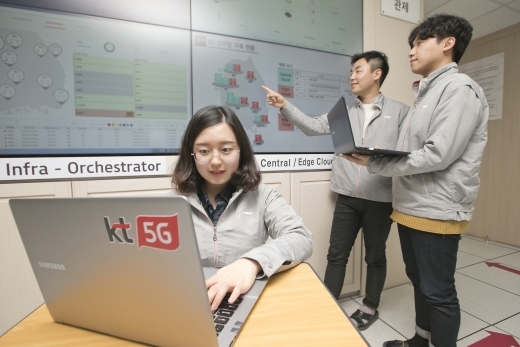Competition grows over ‘edge cloud’ computing market in Korea
Pressed by global cloud giants, South Korean mobile carriers seek to create a niche market with edge computing technology
By Yeo Jun-sukPublished : May 13, 2019 - 16:43
With telecom companies here accelerating efforts to process massive data at faster speeds since the launch of the fifth-generation cellular network, competition in the cloud edge computing market has intensified.
The country’s major mobile carrier KT said Sunday it had installed cloud computing systems at mobile communication centers in Seoul and Busan, where it has been operating edge computing technology since March to improve 5G network quality.
Combining cloud services with edge computing, the cloud edge system boosts the network’s processing speed by minimizing latency. It does not have to go through a centralized data center, which is a standard for standalone cloud computing.
“Depending upon the need for data processing, the cloud edge system in Seoul and Busan can share the burden and reduce latency,” KT said in a statement. “Previously, all data had to be processed at a central data center in Seoul and its surrounding area.”

The country’s biggest mobile carrier, SK Telecom, has also joined the fray with a pledge to launch a cloud edge system within the year. During a shareholders meeting in March, SKT chief Park Jung-ho said the company would work with global cloud companies to establish the system.
The world’s leading cloud service company, Amazon Web Service, has entered the edge computing market with a service called “Greengrass.” Microsoft has boasted its technological prowess with the product Azure Iot Edge.
Given that these global companies have dominated the local cloud service market, the mobile carriers’ latest efforts to combine cloud services with edge computing are designed to create a niche market, industry watchers said.
“It’s hard to say that edge cloud is a core component of cloud computing,” said an official from a cloud computing company in Seoul. “It is difficult to catch up with global giants in a short period of time, so they want to divide the cloud market into many parts.”
While there is no specific data on market share, industry watchers estimate that AWS accounts for about half of the Korean cloud service market. Samsung, LG and other conglomerate have adopted AWS cloud computing for business management.
Currently, the Korean mobile carriers’ efforts to use cloud services are largely aimed at offering subscribers better access to 5G-based content. The carriers expect cloud edge computing to reduce latency by removing the need to go through a centralized data center.
For example, KT said its cloud edge computing system allows for speedy streaming of video content, such as those on YouTube. According to KT, users can enjoy live sport broadcasting about 10 seconds faster than those not using cloud edge computing.
“When we talk about edge computing, it was mostly focused on hardware aspect of network,” said a KT official. “Cloud edge computing is more about delivering better software. … By installing cloud services at our mobile edge center, users can watch YouTube footage much faster than before.”
(jasonyeo@heraldcorp.com)








![[KH Explains] Hyundai's full hybrid edge to pay off amid slow transition to pure EVs](http://res.heraldm.com/phpwas/restmb_idxmake.php?idx=644&simg=/content/image/2024/04/18/20240418050645_0.jpg&u=20240419100350)






![[From the Scene] Monks, Buddhists hail return of remains of Buddhas](http://res.heraldm.com/phpwas/restmb_idxmake.php?idx=652&simg=/content/image/2024/04/19/20240419050617_0.jpg&u=20240419175937)

![[KH Explains] Hyundai's full hybrid edge to pay off amid slow transition to pure EVs](http://res.heraldm.com/phpwas/restmb_idxmake.php?idx=652&simg=/content/image/2024/04/18/20240418050645_0.jpg&u=20240419100350)

![[Today’s K-pop] Illit drops debut single remix](http://res.heraldm.com/phpwas/restmb_idxmake.php?idx=642&simg=/content/image/2024/04/19/20240419050612_0.jpg&u=)